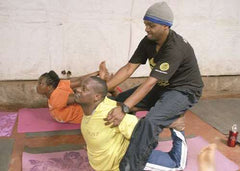How a yoga charity aims to solve youth unemployment in Africa

(MENAFN - Gulf Times) Twelve young adults lie stretched out on rubber mats in the windowless shed that is the Apostolic Light Mission Church in Kangemi, a slum in the Nairobi capital.
The late afternoon sun beats down on the tin roof as the yoga students stretch and breathe. After just ten minutes the groaning gets louder, longer and deeper.
'That's what happiness sounds like! says the instructor, George Thande. 'Welcome to the world of the washboard stomach.
Yoga arrived long ago in Kenya, famous for its long-distance runners, and lots of people take part in sports in the East African nation's cities. There is hardly a fitness studio that doesn't offer yoga.
But the yoga instruction in Kangemi is organised by a charity which doesn't just aim to deliver fitness and relaxation. It also wants to solve a social problem: youth unemployment.
While Kenya has a booming economy and a fast-growing middle class, a lot of young people remain unemployed, though exact figures are unreliable.
The World Bank estimates the number of unemployed at 22 per cent of all 15 to 24-year-olds. The International Labour Organization puts the figure at 67 per cent of all 15 to 34-year-olds.
'The Africa Yoga Project has trained more than 300 yoga teachers in 15 African countries since 2007, says spokeswoman Laura Schutter in Nairobi.
'We mostly target young people in poorer areas, she says. They receive a stipendium while they train, so they don't need to pay anything.
George Thande from Kangemi is one of the trainees. Before he discovered yoga six years ago he repaired telephones and was a professional footballer. When friends told him about yoga he decided to give it a go.
The 32-year-old now makes most of his money by teaching yoga, through the Africa Yoga Project and private instruction.
He asks for the equivalent of between 8 and 21 dollars an hour per person, depending on the size of the class.
As well as three or four paid hours a week, Thande also has to teach for five hours a week in poor areas, in community buildings like the church or Kangemi, as well as primary schools and even prisons.
This is a charitable initiative of the Africa Yoga Project. It's free for the participants and the teachers are paid for their time.
The organisation says that up to 6,000 people take part in 300 yoga classes across Africa including in South Africa, Namibia, Somalia and Mal because of its initiatives.
'Yoga's spiritual element was for the rather superstitious Kenyans rather difficult at first, says Thande.
'It wasn't so easy to explain that it doesn't involve devil worship, he says. 'But in power yoga, which is what we're practising here, fitness is what's most important.
Yoga is more than just a source of income to Thande. 'I wasn't a good person before, he says. 'Yoga has changed my perspective. I wanted fast money, but I didn't want to work for it. Yoga teaches us to set goals, how we can reach them and how to deal with difficult situations.
Today he is a much more patient person, he says. Personal development is an important component of the yoga instructor training at the Yoga Africa Project. It also tries to teach a bit of business management: how to use a computer, how to develop a business plan, a bit of marketing and team leadership.
At the end of Thande's class, all the students sit round in a circle and give thanks: for the lesson, for their health and the gift of life.
'Lots of participants sit together afterwards and share their problems with each other. It creates a community outside of politics and ethnic groups, she says.
Catherine Njeri, who co-ordinates the instructors for Yoga Africa Project, says yoga contributed positively to her personal development.
'I didn't take yoga seriously at first, she says. 'We messed around in class until the teacher asked us ‘what are you waiting for? Your life is happening now.' That changed my tune. - DPA
Original link